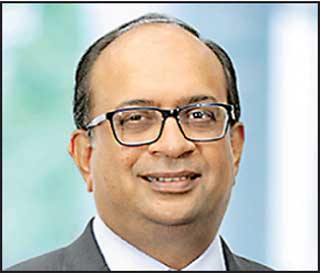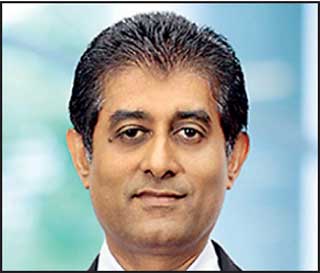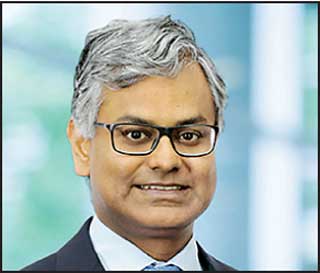Tuesday Feb 24, 2026
Tuesday Feb 24, 2026
Wednesday, 18 August 2021 00:00 - - {{hitsCtrl.values.hits}}
 |
| Chairman Vish Govindasamy |
 |
| Vice Chairman Duminda Hulangamuwa |
 |
| Dep. Vice Chairman Krishan Balendra
|
The premier private sector lobby group the Ceylon Chamber of Commerce has recently advised the Government on how to best set medium- to long-term policies as well as immediate measures to revive the economy despite the COVID-19 pandemic.
It has been proposed to President Gotabaya Rajapaksa the need to set up a national level committee specifically focused on policy formation, review and implementation.
Shared during the Ceylon Chamber›s meeting with the President last month, the proposal is aimed at ensuring a consultative and research-based approach to making key policy and regulatory decisions and successful implementation.
Chaired by the President himself, the Committee should consist of senior policymakers alongside nominees from the private sector including the Ceylon Chamber. A broader set of experts and line ministry officials could be invited to the committee on a subject specific basis, the Chamber has proposed.
The broader framework suggested for the proposed committee includes agenda setting, policy analysis, strategy and policy development, policy enactment and implementation and monitoring and evaluation.
The President has also been requested to grant a seat for the Ceylon Chamber on all relevant task forces he appoints, ensuring that it can thereby effectively contribute.
“President Rajapaksa was very receptive to both proposals submitted by us as part of the chamber’s commitment to extend support to revive socioeconomic growth despite the COVID pandemic,” Ceylon Chamber of Commerce newly-elected Chairman Vish Govindasamy told journalists via a virtual briefing yesterday, along with Vice Chairman Duminda Hulangamuwa and Deputy Vice Chairman Krishan Balendra.
Separately, the Ceylon Chamber also called on new Finance Minister Basil Rajapaksa and presented an economic revival action plan for his consideration.
With a view of achieving a sustainable growth rate of over 5% and stability in macroeconomic variables like the currency, inflation and interest rates, the Chamber prepared a paper for economic revival with the aim of improving its balance of payments and fiscal position.
It contained a set of short-term strategies (next three to six months) and medium-term strategies (next six to 18 months).
The Chamber has requested a credible plan on refinancing the debt spanning till 2026 and beyond. It also stressed that the Government must seek support from the IMF given the limited options beyond bilateral swaps, credit lines, etc.
“The private sector needs to know what the long-term plan of the Government is in terms of debt servicing,” said Govindasamy whilst, Ceylon Chamber CEO Manjula de Silva said such a move would help build confidence in international financial markets and rating agencies.
The Chamber had also suggested a small increase in local interest rates of about 25 to 50 basis points. “This will help reduce the interest rate arbitrage between interest rates for dollar fixed deposit rates and local rupee deposit rates,” said Govindasamy, who added that the Government should ensure a realistic and competitive exchange rate as opposed to what it was now.
Extending the debt moratorium, especially for the tourism sector, and ensuring adequate foreign exchange for the export sector to import key inputs were some of the other short-term suggestions.
The Ceylon Chamber Chairman had also requested the Finance Minister in the medium term to set up a permanent secretariat to fast-track reforms and unlock some of the bottlenecks towards FDI growth such as availability of land and labour resources.
In its meeting with former Foreign Minister Dinesh Gunawardena, the Chamber had shared its ideas in ensuring the continuity of GSP+ concessions from the European Union. “The Government must separate geopolitics from trade promotion,” Govindasamy added.
Pursuing new Free Trade Agreements (FTAs), especially with the UK, which is out of the EU now, was another recommendation. Govindasamy said the UK was signing many FTAs with other countries post-Brexit.
